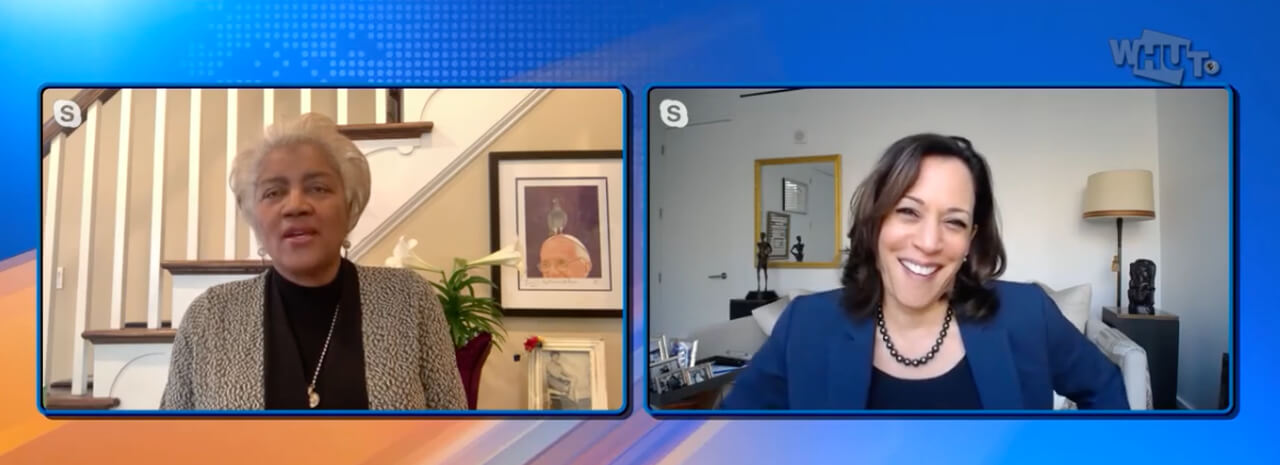
WASHINGTON – United States Senator and Howard University alumna Kamala D. Harris joined veteran political strategist and author Donna Brazile for a virtual discussion on coronavirus’s impact to public health, the economy, voting, and more during a segment of the Gwendolyn and Colbert I. King Public Policy Lecture Series at Howard University. Senator Harris spoke pointedly about the impact of coronavirus on our nation and addressed the need for a more comprehensive response from the White House.
“I want to start by recognizing Howard University’s historic role in addressing the health and well-being of the American people and the groundbreaking work that still happens,” said Harris. “When we look at the historical issues that have plagued black Americans, Howard University has been at the forefront of those issues.”
Brazile engaged Senator Harris on today’s most anticipated issues related to the COVID-19 pandemic, from access to testing to the shortage of personal protective equipment (PPE) for individuals and frontline workers. Brazile asked Harris what she thinks state and local governments can do to address the lack of supplies.
“This should be happening from our federal government. but it’s not. So, states have to implement this, and many are doing this. We need to centralize information about where the supplies are and where the needs are,” said Harris. “We want to predict ahead of time where it’s going to pop and make sure the supplies are there when needed and then when it subsides, then we get the supplies to the next place.”
Senator Harris said this means creating a centralized database to track information about where supplies like masks and ventilators are located and where the greatest needs are. In addition to the lack of supplies and tests, Brazile and Harris addressed coronavirus’ disparate impact on African Americans and the rise in anti-Asian racism.
“Seventy percent of those who have been afflicted are black. Poor people, people of color, black people are going to be affected,” said Harris. “This highlighted and put a microscope on pre-existing disparities based on race, health care and health conditions and it is making it even worse in terms of those populations that are most vulnerable and most in need.”
Senator Harris and Brazile discussed coronavirus’ impact on incarcerated populations. Harris said she is calling on the Federal Bureau of Prisons to institute a policy for early release of vulnerable individuals, including the elderly, those who are pregnant, and those with underlying conditions.
“People will be sentenced to death if the Bureau of Prisons doesn’t take the necessary steps.”
The conversation finally turned to the 2020 elections and the challenges coronavirus creates for voters.
“We need to have a national program allowing people to vote by mail,” said Harris. “We also have to improve the conditions during which people vote if they don’t vote by mail. We saw in Wisconsin, it was the ride or die folks who were standing in those lines, often not social distancing like they needed to, but were there because they wanted to make sure their voice counts.”
Senator Harris said she is making a proposal to put systems in place to address the impact coronavirus will have on accessibility to polls in November.
To view a recording of Coronavirus Update: A Conversation with Howard University Alum & U.S. Senator Kamala D. Harris, hosted by WHUT-Howard University Television and WHUR 96.3 FM visit https://www.whut.org/home/klswithkamalaharris/.
###
About Howard University
Founded in 1867, Howard University is a private, research university that is comprised of 13 schools and colleges. Students pursue studies in more than 120 areas leading to undergraduate, graduate and professional degrees. The University operates with a commitment to Excellence in Truth and Service and has produced one Schwarzman Scholar, three Marshall Scholars, four Rhodes Scholars, 11 Truman Scholars, 25 Pickering Fellows and more than 70 Fulbright Scholars. Howard also produces more on-campus African-American Ph.D. recipients than any other university in the United States. For more information on Howard University, visit www.howard.edu.
Media Contact: Misha Cornelius, misha.cornelius@howard.edu




